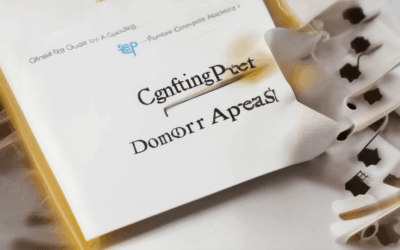Securing corporate sponsorships for events is a strategic move that can transform your event’s success, offering mutual benefits for both organizers and sponsors. In today’s competitive landscape, businesses are increasingly seeking partnerships that align with their goals, making corporate sponsorships a valuable tool for event planners. This guide delves into the ins and outs of navigating the sponsorship world, from identifying potential partners to crafting compelling proposals and maintaining lasting relationships. Whether you’re new to securing sponsorships or looking to refine your strategy, this comprehensive resource will equip you with actionable insights and proven tactics to attract and retain corporate sponsors, ensuring your event’s growth and impact.
Key Takeaways
– Types of Sponsorships: Understand the four primary types—financial, in-kind, media, and promotional—each offering unique benefits for event organizers and businesses.
– Benefits of Sponsorships: Gain market reach, brand awareness, and access to target audiences while supporting events or causes.
– What Sponsors Receive: Enjoy broad visibility, access to targeted audiences, customized marketing solutions, networking opportunities, impact reporting, and expert guidance.
– ABCs of Sponsorship: Focus on Awareness (brand recognition), Benefits (credibility and network access), and Contribution (financial or in-kind support) to build lasting partnerships.

How to Get Corporate Sponsorship for an Event
To effectively secure corporate sponsorship for your event, follow these organized steps:
1. Define Your Event Goals
- Clarify the purpose of your event, whether it’s fundraising, networking, or promoting a cause.
- Determine how sponsorship aligns with your organization’s mission and the sponsor’s goals.
2. Identify Potential Sponsors
- Target local businesses, large corporations, and industry-specific companies aligned with your event’s theme.
- Consider the size and financial capacity of potential sponsors.
- Research companies known for CSR (Corporate Social Responsibility) initiatives.
3. Develop Sponsorship Packages
- Create tiered packages (e.g., Platinum, Gold, Silver) offering varying benefits like branding, exposure, and networking opportunities.
- Incorporate customizable options for unique sponsorships.
- Example: Platinum – Logo placement, VIP access; Gold – Branding, social media mentions; Silver – Mention in materials.
4. Create a Compelling Proposal
- Include event details: Date, location, and purpose.
- Highlight sponsorship benefits and ROI for the sponsor.
- Offer a detailed breakdown of each package and associated costs.
- Provide a payment schedule or deadline for commitments.
5. Proactively Seek Sponsors
- Reach out via email or arrange face-to-face meetings.
- Follow up consistently to maintain interest and urgency.
- Be prepared to negotiate terms and adapt to sponsor needs.
6. Promote the Event and Sponsors
- Utilize press releases, social media, and partnerships to increase visibility.
- Highlight past sponsors and their contributions to build credibility.
- Showcase success stories to attract future sponsors.
7. Negotiate and Finalize Contracts
- Discuss terms clearly, including deliverables and expectations.
- Ensure contracts outline payment methods and deadlines.
- Finalize agreements with mutual understanding and accountability.
8. Acknowledge Sponsors Publicly
- Thank sponsors during the event and in promotional materials.
- Highlight their contributions in newsletters and reports.
- Provide feedback post-event to strengthen future relationships.
9. Maintain Post-Event Communication
- Follow up with sponsors to evaluate the partnership’s success.
- Seek feedback for improvements and express gratitude.
- Stay connected for potential future collaborations.
10. Optimize for SEO and Content Strategy
- Use keywords like “corporate sponsorship,” “event funding,” and “how to get sponsors.”
- Write SEO-optimized content on NPO Expert to attract organizations seeking sponsorship tips.
- Incorporate internal links to related articles for better navigation and SEO performance.
By following these steps, you can effectively secure corporate sponsorship and enhance your event’s success.
Companies That Offer Sponsorship Opportunities
Sponsorship is a popular way for businesses to support events and gain visibility. Here are some companies that commonly offer sponsorship opportunities:
- Corporate Sponsors: Many large corporations have sponsorship programs tailored for events. Companies like Corporate Sponsorship , Cvent , and Bizzabo specialize in connecting businesses with event organizers.
- Event Industry Vendors: Businesses that supply products or services for events often become sponsors. Examples include Limelight , Samsung , and John Lewis .
- Nonprofit Supporters: Organizations focused on charity and fundraising, such as Red Cross , UNICEF USA , and NPO Expert , frequently sponsor events aligned with their missions.
- Brand Partnerships: Companies seeking brand exposure may partner as sponsors. Brands like Pepsi , Apple , and Google often invest in high-profile events.
- Local and Community Sponsors: Businesses within the event’s vicinity, such as Starbucks , Walmart , and local banks, often sponsor community events.
To learn more about these sponsorship options and how to approach companies, visit NPO Expert . They provide detailed guides and resources for finding the perfect sponsor for your event.

Sponsorship Costs for Events
Event sponsorship costs vary widely depending on the event’s scale, reach, and the level of engagement sought by the sponsor. Here’s a breakdown of typical sponsorship tiers and associated costs:
- Entry-Level Sponsorship ($5,000 – $15,000): Ideal for new or smaller businesses. Includes basic branding, promotional materials, and a booth presence.
- Premium Sponsorship ($15,000 – $50,000): Offers enhanced visibility through speaking opportunities, exclusive networking sessions, and premium branding.
- Platinum Sponsorship ($50,000 – $200,000+): Provides the highest level of exposure, including event exclusivity, extensive branding, and access to key decision-makers.
Key Considerations:
- ROI Calculation: Sponsors evaluate ROI based on attendee numbers, visibility, and conversion potential. Larger companies may invest more due to broader reach.
- Event Type: High-profile events like conferences often command higher fees compared to local charity events.
- Location and Prestige: Venue and event reputation significantly influence sponsorship costs.
For instance, a company might spend $100,000 to sponsor a major conference, leveraging the event’s audience for brand exposure and lead generation. Case studies show successful sponsorships yielding significant returns through increased visibility and customer acquisition.
Ultimately, sponsorship costs depend on alignment with marketing objectives and budget constraints. Companies should strategically select sponsorships that offer the best ROI and align with their brand goals.

What Are the 4 Types of Sponsorships?
Sponsorships are a powerful tool for businesses and organizations to support events, causes, or projects while gaining exposure and brand visibility. Here are the four primary types of sponsorships, each offering unique benefits and opportunities:
1. Financial Sponsorship
A financial sponsorship involves contributing monetary funds to an event or organization. This type of sponsorship allows sponsors to directly support the event’s operational costs, helping it run smoothly. Examples include large corporations sponsoring marathons or charities supporting community initiatives.
2. In-Kind Sponsorship
In-kind sponsorships involve donating goods or services rather than cash. Sponsors provide materials, services, or products that the event or organization needs to succeed. For instance, a company might donate equipment for an event or provide catering services.
3. Media Sponsorship
Media sponsorships occur when a company or organization pays to have advertising space or coverage in print, online, or through broadcast media. This type of sponsorship often includes logo placement, feature articles, or mentions in event promotions. Examples include magazine ads or social media shoutouts.
4. Promotional Sponsorship
Promotional sponsorships focus on increasing the sponsor’s visibility through branding and marketing activities. Sponsors may receive logo placements, branding opportunities, or exclusive rights to promote their brand during the event. This type is popular in sports events and major conferences.
Benefits of Sponsorships
Sponsorships can help event organizers cover costs while offering valuable partnerships. For businesses, they provide market reach, brand awareness, and access to target audiences. Effective sponsorships align both parties’ goals, ensuring mutual benefits.
By understanding these types, event organizers can choose the best fit for their needs, while businesses can select sponsorships that align with their marketing objectives. To learn more about optimizing your sponsorship strategy, visit our main website .
What Do Sponsors Get in Return?
NPO Expert understands the importance of building strong relationships with sponsors, which is why we offer comprehensive tools and resources to maximize the value of sponsorships for nonprofits. Here’s what sponsors can expect when they partner with NPO Expert:
- Broad Visibility and Brand Exposure
- Sponsors gain extensive visibility through our platform, reaching a diverse audience of nonprofit professionals and stakeholders.
- Brand placement on our website and promotional materials ensures consistent exposure to our engaged community.
- Access to Targeted Audiences
- NPO Expert connects sponsors with highly targeted audiences, ensuring maximum ROI through relevant engagement opportunities.
- Our platform caters to decision-makers and influencers in the nonprofit sector, providing unparalleled access to potential donors and partners.
- Customized Marketing Solutions
- Sponsors receive personalized marketing materials and strategies tailored to their brand and objectives.
- From logo placements to social media campaigns, we offer flexible solutions to align with your marketing goals.
- Networking Opportunities
- Partnerships with NPO Expert open doors to networking events and forums, connecting sponsors with industry leaders and peers.
- Access to exclusive events and resources fosters meaningful connections and collaboration opportunities.
- Impact Reporting and Recognition
- Sponsors receive detailed reports on the outcomes of their contributions, demonstrating the tangible impact of their support.
- Recognition on our platform and in event materials highlights the sponsor’s commitment to the nonprofit community.
- Expert Support and Guidance
- NPO Expert provides ongoing assistance, ensuring sponsors achieve their goals and maximize the effectiveness of their partnerships.
- Our team is available to offer strategic advice and help navigate the complexities of nonprofit sponsorship.
By partnering with NPO Expert, sponsors gain more than just exposure—they invest in a trusted platform that drives meaningful change. Our commitment to transparency and excellence ensures every partnership is mutually beneficial and impactful.

What Are the ABCs of Sponsorship?
The ABCs of sponsorship refer to three fundamental components that define the relationship between a sponsor and an organization or event. These components ensure alignment, mutual benefits, and long-term partnerships. Here’s a breakdown:
A – Awareness
Sponsorship begins with awareness. Sponsors gain visibility through branding, logo placement, and promotional materials. Effective sponsorship strategies often include:
- Brand recognition in promotional materials and event collateral.
- Logo placement on website, social media, and event signage.
- Media coverage and mentions in press releases and articles.
- Opportunities for sponsored content distribution via email newsletters or blogs.
B – Benefits
Sponsorship offers numerous benefits for both parties involved. Organizations benefit by gaining financial support, while sponsors receive exposure and access to valuable networks. Key benefits include:
- Credibility and trust within the target audience.
- Access to exclusive events, networking opportunities, and premium experiences.
- Marketing and brand-building through association with a respected organization.
- Engagement with a loyal customer base or donor pool.
C – Contribution
Contribution is the cornerstone of sponsorship. Sponsors provide financial or in-kind support to help organizations achieve their goals. Contributions may include:
- Dollar-for-dollar donations or grants.
- In-kind contributions such as goods, services, or equipment.
- Multi-year commitments to ensure stability and growth.
- Engagement opportunities through tickets, memberships, or exclusive events.
NPO Expert encourages organizations to carefully evaluate sponsorship opportunities that align with their mission and audience needs. By focusing on these ABCs, both sponsors and organizations can build meaningful, long-lasting partnerships that drive success.





0 Comments